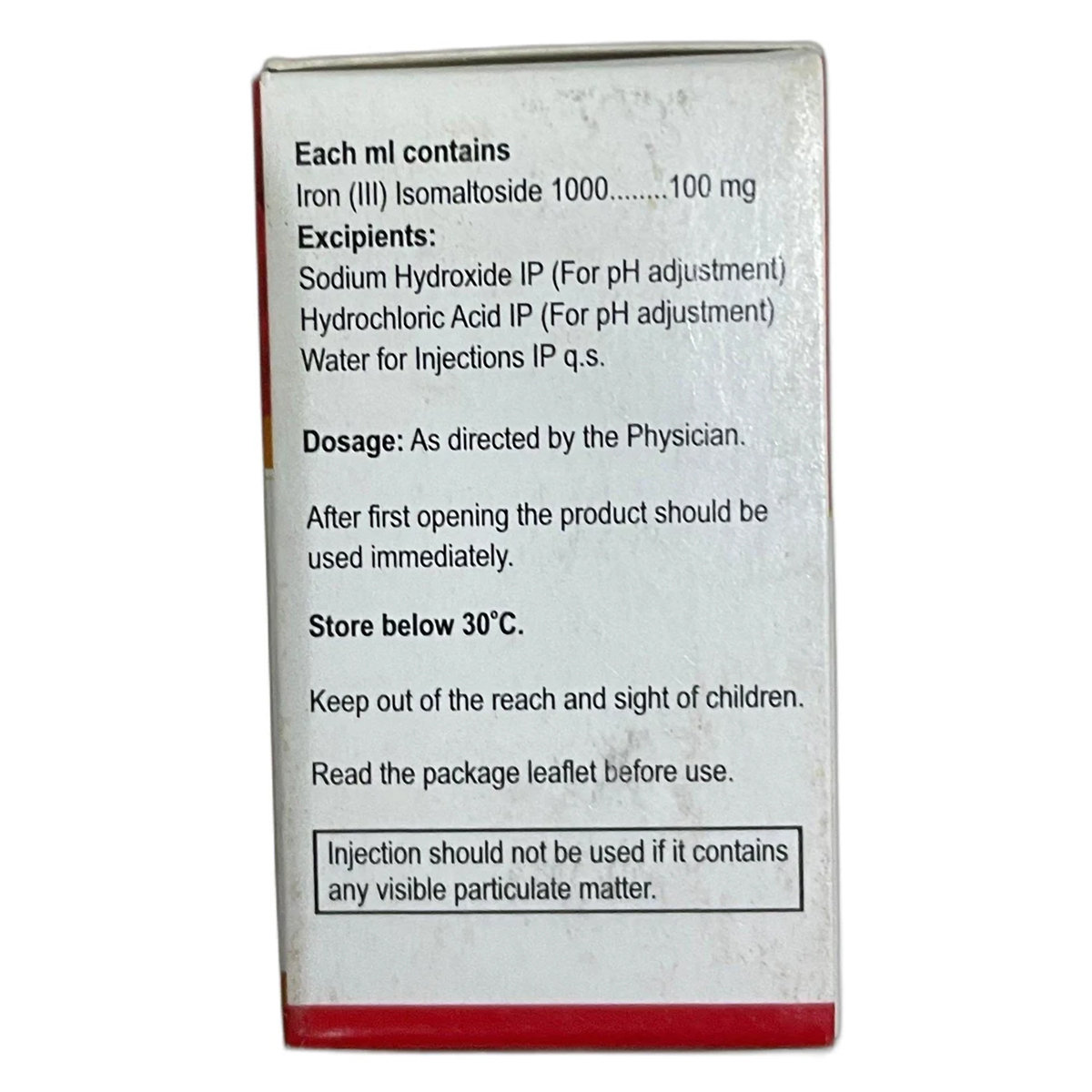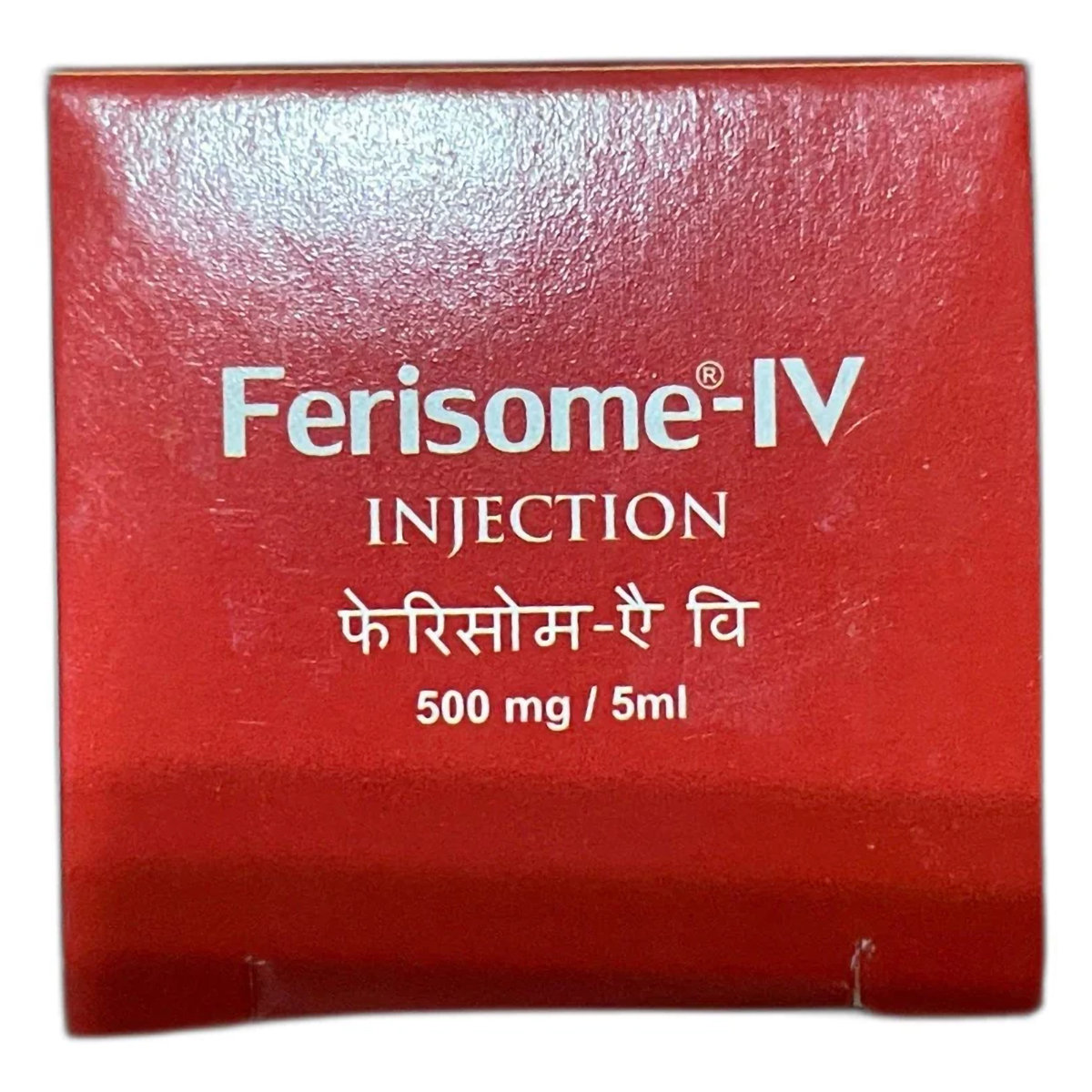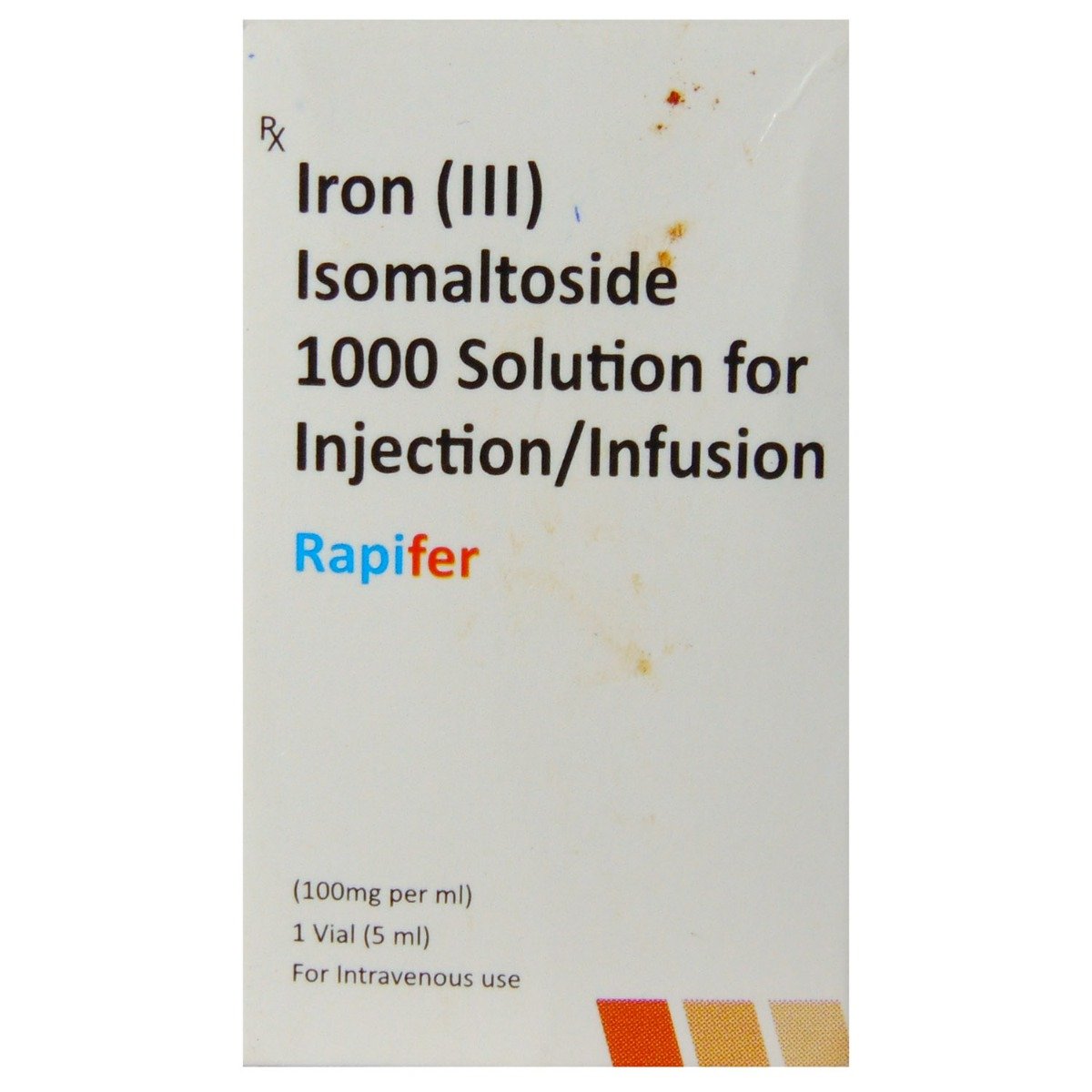Ferisome-IV 500 mg Injection 5 ml
MRP ₹3500
(Inclusive of all Taxes)
₹525.0 Cashback (15%)
Provide Delivery Location

secured payment

india's most trusted pharmacy

genuine products
Composition :
Manufacturer/Marketer :
Consume Type :
Expires on or after :
Return Policy :
About Ferisome-IV 500 mg Injection 5 ml
Ferisome-IV 500 mg Injection 5 ml belongs to the group of anti-anaemic medicines used to treat iron deficiency anaemia in patients who are intolerant to oral iron, in those who require iron very quickly to build up the iron stores. Iron deficiency anaemia (lack of red blood cells caused by too little iron in the body) is a condition in which the body does not have enough red blood cells to carry adequate oxygen to various body tissues.
Ferisome-IV 500 mg Injection 5 ml contains ‘iron isomaltoside’, which acts as a source of iron and helps in the transportation of oxygen throughout the body and the production of red blood cells. Thereby, Ferisome-IV 500 mg Injection 5 ml helps in treating anaemia. Iron is necessary for various vital processes in the body.
Ferisome-IV 500 mg Injection 5 ml will be administered by a healthcare professional; do not self-administer. In some cases, you may experience certain common side effects such as nausea, rash, and injection site reactions. Most of these side effects do not require medical attention and will resolve gradually over time. However, you are advised to talk to your doctor if you experience these side effects persistently.
Let your doctor know if you are taking any prescription, non-prescription drugs, or herbal products before starting Ferisome-IV 500 mg Injection 5 ml. If you are known to be allergic to any of the components in Ferisome-IV 500 mg Injection 5 ml, please inform your doctor. Consult a doctor if you are pregnant or breastfeeding. Ferisome-IV 500 mg Injection 5 ml is not recommended for children as safety and effectiveness have not been established.
Uses of Ferisome-IV 500 mg Injection 5 ml

Have a query?
Directions for Use
Key Benefits
Ferisome-IV 500 mg Injection 5 ml belongs to the group of anti-anaemic medicines used to treat iron deficiency anaemia in patients who are intolerant to oral iron preparations and those who require iron very quickly to build up the iron stores. Ferisome-IV 500 mg Injection 5 ml acts as a source of iron and helps in the transportation of oxygen throughout the body and the production of red blood cells. Thereby, Ferisome-IV 500 mg Injection 5 ml helps in treating anaemia. Iron is necessary for various vital processes in the body.
Storage
- If you experience low blood pressure symptoms like dizziness, lightheadedness, or fainting while taking medication, seek immediate medical attention.
- Make lifestyle modifications and adjust your medication regimen under medical guidance to manage low blood pressure.
- As your doctor advises, regularly check your blood pressure at home. Record your readings to detect any changes and share them with your doctor.
- Fluid intake plays a vital role in managing blood pressure by maintaining blood volume, regulating blood pressure, and supporting blood vessel function. Drinking enough fluids helps prevent dehydration, maintain electrolyte balance, and regulate fluid balance.
- Take regular breaks to sit or lie down if you need to stand for long periods.
- When lying down, elevate your head with extra pillows to help improve blood flow.
- Avoid heavy exercise or strenuous activities that can worsen low blood pressure.
- Wear compression socks as your doctor advises to enhance blood flow, reduce oedema, and control blood pressure.
- If symptoms persist or worsen, or if you have concerns about your condition, seek medical attention for personalized guidance and care.
- Chest pain may last for a while and needs immediate medical attention as it is a significant health issue to be attended to.
- Take rest and refrain from doing physical activity for a while, and restart after a few days.
- Try applying an ice pack to the strained area for at least 20 minutes thrice a day. Ice pack thus helps reduce inflammation.
- Sit upright and maintain proper posture if there is persistent chest pain. • Use extra pillows to elevate your position and prop your chest up while sleeping.
- Your doctor may stop or adjust the dose of your medication that might be causing fluid buildup and may prescribe diuretics to help remove extra fluid.
- Limit your intake of salt and monitor how much fluid you drink regularly.
- Regularly check your weight and blood pressure, and keep track of your urine output to see how your condition is improving.
- Stay at a healthy weight, drink alcohol in moderation, limit caffeine intake, and quit smoking to help prevent your symptoms from getting worse.
- Exercise regularly, get enough sleep, and manage stress to improve your overall health.
- Heart failure needs immediate medical attention. To manage this effect, the doctor's instructions must be followed strictly.
- Take care of change in your weight as there can be sudden changes.
- Rest and refrain from physical activity, and restart after a few days.
- Reduce your salt intake and control your diet with the help of a dietician.
- Track your symptoms and keep your follow-up appointments to manage severe side effects.
- Drink plenty of fluids and stay hydrated.
- Avoid foods containing sugars, salts and processed food.
- Avoid consumption of alcohol.
- Take healthy diet containing fiber, carbohydrates and lean proteins.
- Exercise regularly and maintain a healthy lifestyle.
- Include omega-3 rich foods like fatty fish, ground flax, flaxseed oil, and walnuts.
- Consume calcium-rich dairy products for bone health.
- Eat green and leafy vegetables for essential nutrients.
- Include lean protein sources like eggs and whole grains.
- Use herbs and spices for added flavor and nutrition.
- Choose fortified foods for extra nutritional benefits.
- Get plenty of sleep for overall health and well-being.
- Inform Your Doctor: Notify your doctor immediately about your diarrhoea symptoms. This allows them to adjust your medication or provide guidance on managing side effects.
- Stay Hydrated: Drink plenty of fluids to replace lost water and electrolytes. Choose water, clear broth, and electrolyte-rich drinks. Avoid carbonated or caffeinated beverages to effectively rehydrate your body.
- Follow a Bland Diet: Eat easy-to-digest foods to help firm up your stool and settle your stomach. Try incorporating bananas, rice, applesauce, toast, plain crackers, and boiled vegetables into your diet.
- Avoid Trigger Foods: Steer clear of foods that can worsen diarrhoea, such as spicy, fatty, or greasy foods, high-fibre foods, and dairy products (especially if you're lactose intolerant).
- Practice Good Hygiene: Maintain good hygiene to prevent the spread of infection. To stay healthy, wash your hands frequently, clean and disinfect surfaces regularly, and avoid exchanging personal belongings with others.
- Take Anti-Diarrheal Medications: If your doctor advises, anti-diarrheal medications such as loperamide might help manage diarrhoea symptoms. Always follow your doctor's directions.
- Keep track of your diarrhoea symptoms. If they don't get better or worse or are accompanied by severe stomach pain, blood, or dehydration signs (like extreme thirst or dark urine), seek medical help.
Drug Warnings
Do not take Ferisome-IV 500 mg Injection 5 ml if you are allergic to any of its contents, if you have anaemia not caused due to iron deficiency, iron overload (excess iron in the body), liver cirrhosis, or disturbances in iron utilisation. Inform your doctor if you have systemic lupus erythematosus, rheumatoid arthritis, severe asthma, eczema, bacterial infection, low phosphorus levels, high/low blood pressure, kidney or liver problems. Consult your doctor if you are pregnant or breastfeeding. Ferisome-IV 500 mg Injection 5 ml is not recommended for children as safety and effectiveness have not been established. Let your doctor know if you are taking any prescription, non-prescription drugs, or herbal products before starting Ferisome-IV 500 mg Injection 5 ml.
Drug-Drug Interactions
Drug-Drug Interactions
Login/Sign Up
Drug-Food Interactions
Drug-Food Interactions
Login/Sign Up
Diet & Lifestyle Advise
- Follow a well-balanced diet.
- Eat a healthy diet, especially green leafy vegetables, and do regular physical exercise.
- Limit junk food items from the outside and stick to freshly prepared home-cooked meals.
- Increase intake of fruits in the diet especially fruits rich in iron like pomegranate, and citrus fruits.
- Drink plenty of fluids to keep yourself hydrated.
- Include leafy vegetables, poultry, seafood, beans, nuts, seeds, meat and fortified food in your diet.
Habit Forming
Therapeutic Class
All Substitutes & Brand Comparisons
RX
Out of StockIsoalfa Injection 5 ml
Alniche Life Sciences Pvt Ltd
₹3100
(₹508.4/ 1ml)
11% CHEAPERRX
Out of StockRapifer Injection 5 ml
Corona Remedies Pvt Ltd
₹2860
(₹514.8/ 1ml)
10% CHEAPERRX
Out of StockFur Solution for Injection
Corona Remedies Pvt Ltd
₹3146
(₹515.94/ 1ml)
10% CHEAPER
Alcohol
Safe if prescribed
It is unknown if alcohol interacts with Ferisome-IV 500 mg Injection 5 ml, so please consult a doctor.
Pregnancy
Consult your doctor
Consult your doctor if you are pregnant. Your doctor will decide if Ferisome-IV 500 mg Injection 5 ml can be taken during pregnancy or not.
Breast Feeding
Consult your doctor
Consult your doctor if you are breastfeeding. Your doctor will decide if Ferisome-IV 500 mg Injection 5 ml can be taken by breastfeeding mothers or not.
Driving
Safe if prescribed
It is not known if Ferisome-IV 500 mg Injection 5 ml affects your ability to drive. Drive or operate machinery only if you are alert.
Liver
Consult your doctor
Please consult your doctor if you have a liver impairment or any concerns regarding this.
Kidney
Consult your doctor
Please consult your doctor if you have kidney impairment or any concerns regarding this.
Children
Safe if prescribed
Ferisome-IV 500 mg Injection 5 ml is not recommended for children as safety and effectiveness have not been established.
FAQs
Ferisome-IV 500 mg Injection 5 ml acts as a source of iron and helps in the transportation of oxygen throughout the body and the production of red blood cells. Thereby, Ferisome-IV 500 mg Injection 5 ml helps in treating anaemia.
Ferisome-IV 500 mg Injection 5 ml might cause hypophosphatemia (low phosphorus levels). Inform your doctor if you experience symptoms such as severe tiredness, bone or muscle pain, as these could be a sign of low phosphorus levels. Regular monitoring of phosphorus levels whilst on treatment with Ferisome-IV 500 mg Injection 5 ml is advised.
Consult your doctor if you have hypertension as Ferisome-IV 500 mg Injection 5 ml might sometimes cause low or high blood pressure.
Ferisome-IV 500 mg Injection 5 ml might cause the stools to appear darker than usual; this is due to the elimination of unabsorbed iron. Do not worry, as it is normal and harmless. Consult a doctor if this bothers you or if you notice blood in stools.
Ferisome-IV 500 mg Injection 5 ml might reduce the absorption of oral iron. Inform your doctor if you are taking oral iron preparations or any supplements.
Country of origin
Manufacturer/Marketer address
Disclaimer
Author Details
We provide you with authentic, trustworthy and relevant information








_0.jpg?tr=q-85)

